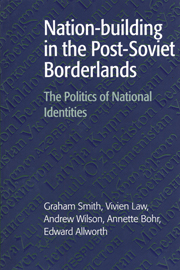Book contents
1 - Post-colonialism and borderland identities
Published online by Cambridge University Press: 01 June 2011
Summary
As the dust of the immediate post-Soviet transition settles, we are now better placed to begin to examine how national identities are being reforged in the fourteen borderland states of what up until December 1991 constituted the non-Russian union republics of the former Soviet Union. Having secured sovereign spaces following the collapse of the world's largest multiethnic federation, the borderland states are now embarking upon nation-building. And herein lies the paradox. The post-colonial desire to recreate national identities can facilitate solidarity, play a positive role in state-making and form a basis for popular participation in politics. A politics defined in relation to a particular national community may not in itself be incompatible with processes of democratisation. The problem arises when national or ethnic identity is predicated on a form of imagined community that reifies the importance of national or ethnic boundaries to the detriment of the wider political community. In this regard, there is as yet only limited evidence to suggest that the post-Soviet borderland states are on the threshold of entering such a post-national era in which national and ethnic identities have been superseded by understandings of cultural difference based on a broader and more inclusive vision of political community. Rather, although the scale of inter-ethnic violence as witnessed in TransDniester, Nagorno-Karabakh and Georgia in the late 1980s and the first half of the 1990s has now diminished, national identities continue to be caught up in power struggles, leadership elections, legislative acts and in the state distribution of social goods.
- Type
- Chapter
- Information
- Nation-building in the Post-Soviet BorderlandsThe Politics of National Identities, pp. 1 - 20Publisher: Cambridge University PressPrint publication year: 1998
- 9
- Cited by



